用英语讲孔子的故事
- 格式:doc
- 大小:12.34 KB
- 文档页数:2
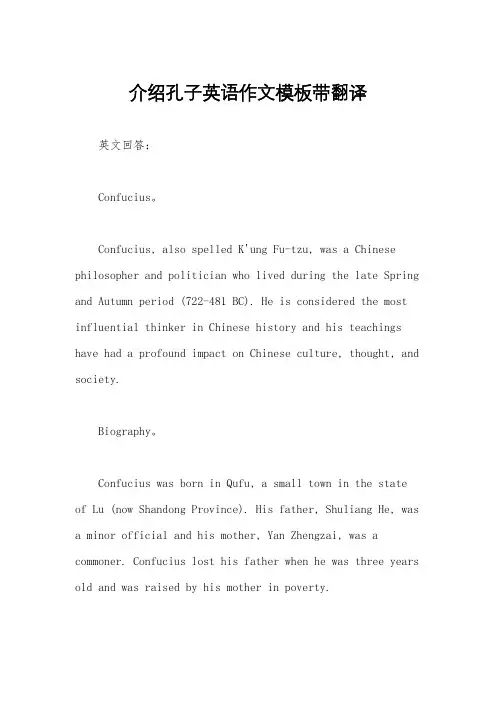
介绍孔子英语作文模板带翻译英文回答:Confucius。
Confucius, also spelled K'ung Fu-tzu, was a Chinese philosopher and politician who lived during the late Spring and Autumn period (722-481 BC). He is considered the most influential thinker in Chinese history and his teachings have had a profound impact on Chinese culture, thought, and society.Biography。
Confucius was born in Qufu, a small town in the state of Lu (now Shandong Province). His father, Shuliang He, was a minor official and his mother, Yan Zhengzai, was a commoner. Confucius lost his father when he was three years old and was raised by his mother in poverty.At the age of 17, Confucius began his studies in the classics and rituals. He quickly became renowned for his intelligence and wisdom. In his early twenties, he began teaching and attracting a following of students.In 517 BC, Confucius was appointed Minister of Crime in Lu. He implemented a number of reforms, including a systemof merit-based appointments. However, his reforms were not well-received by all and he was eventually forced to resign.Confucius spent the rest of his life traveling fromstate to state, teaching and searching for a ruler whowould put his ideas into practice. However, he was never able to find such a ruler.Confucius died in 479 BC at the age of 73. He wasburied in Qufu, which is now a major pilgrimage site for Confucianists.Teachings。
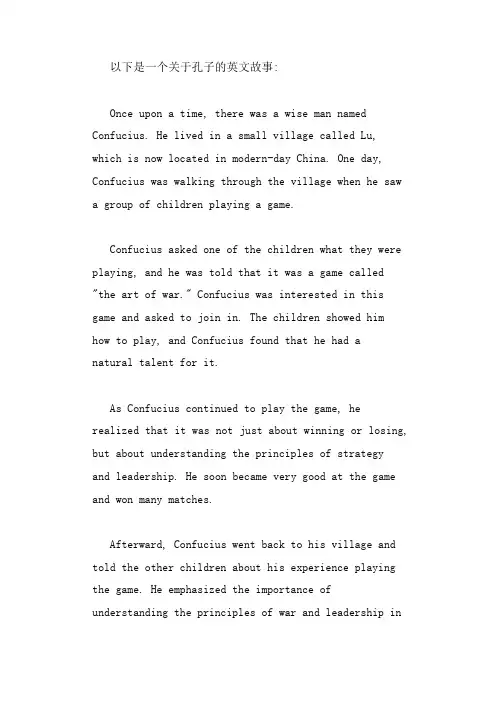
以下是一个关于孔子的英文故事:Once upon a time, there was a wise man named Confucius. He lived in a small village called Lu, which is now located in modern-day China. One day, Confucius was walking through the village when he saw a group of children playing a game.Confucius asked one of the children what they were playing, and he was told that it was a game called "the art of war." Confucius was interested in this game and asked to join in. The children showed him how to play, and Confucius found that he had anatural talent for it.As Confucius continued to play the game, herealized that it was not just about winning or losing, but about understanding the principles of strategyand leadership. He soon became very good at the game and won many matches.Afterward, Confucius went back to his village and told the other children about his experience playing the game. He emphasized the importance of understanding the principles of war and leadership inorder to be a successful leader.From that day on, the children in the village started to refer to Confucius as "the Master" because of his wisdom and his ability to teach others about the principles of war and leadership.This story shows us the importance of learning from our experiences and using what we learn to help others. It also highlights the role of a wise teacher in passing on knowledge and wisdom to others.。
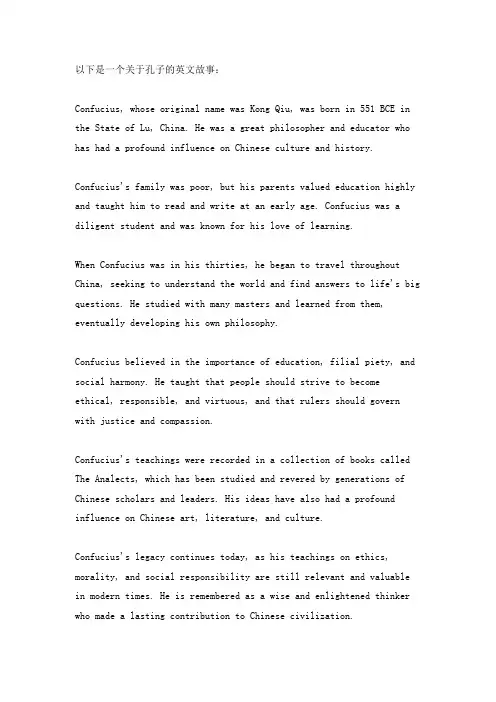
以下是一个关于孔子的英文故事:Confucius, whose original name was Kong Qiu, was born in 551 BCE in the State of Lu, China. He was a great philosopher and educator who has had a profound influence on Chinese culture and history.Confucius's family was poor, but his parents valued education highly and taught him to read and write at an early age. Confucius was a diligent student and was known for his love of learning.When Confucius was in his thirties, he began to travel throughout China, seeking to understand the world and find answers to life's big questions. He studied with many masters and learned from them, eventually developing his own philosophy.Confucius believed in the importance of education, filial piety, and social harmony. He taught that people should strive to become ethical, responsible, and virtuous, and that rulers should govern with justice and compassion.Confucius's teachings were recorded in a collection of books called The Analects, which has been studied and revered by generations of Chinese scholars and leaders. His ideas have also had a profound influence on Chinese art, literature, and culture.Confucius's legacy continues today, as his teachings on ethics, morality, and social responsibility are still relevant and valuablein modern times. He is remembered as a wise and enlightened thinker who made a lasting contribution to Chinese civilization.译文:孔子,原名孔丘,公元前551年出生于中国鲁国。
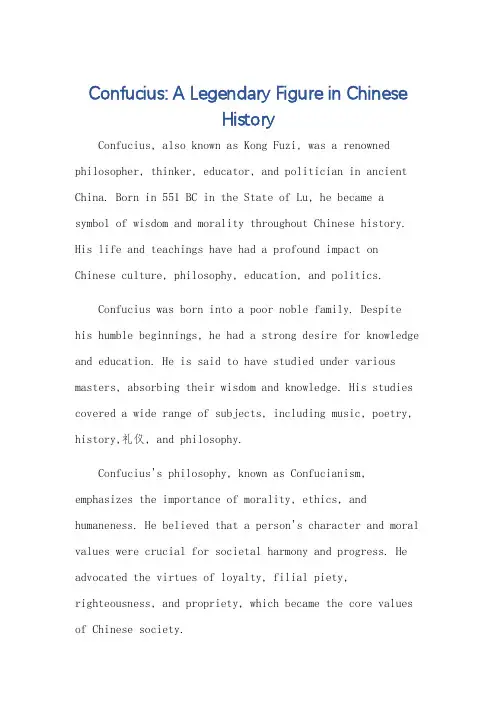
Confucius: A Legendary Figure in ChineseHistoryConfucius, also known as Kong Fuzi, was a renowned philosopher, thinker, educator, and politician in ancient China. Born in 551 BC in the State of Lu, he became a symbol of wisdom and morality throughout Chinese history. His life and teachings have had a profound impact on Chinese culture, philosophy, education, and politics.Confucius was born into a poor noble family. Despite his humble beginnings, he had a strong desire for knowledge and education. He is said to have studied under various masters, absorbing their wisdom and knowledge. His studies covered a wide range of subjects, including music, poetry, history,礼仪, and philosophy.Confucius's philosophy, known as Confucianism, emphasizes the importance of morality, ethics, and humaneness. He believed that a person's character and moral values were crucial for societal harmony and progress. He advocated the virtues of loyalty, filial piety, righteousness, and propriety, which became the core values of Chinese society.Confucius also placed a strong emphasis on education.He believed that education was the key to personal growth and societal progress. He advocated the idea of "teaching without distinction," meaning that education should be accessible to all, regardless of their social status or wealth. His philosophy of education has had a lastingimpact on Chinese education systems, even to this day.In addition to his philosophical and educational contributions, Confucius also served as an official in the government of the State of Lu. However, due to political conflicts and disagreements with the ruling class, he was forced to leave his position and embark on a life of wandering, teaching and preaching his philosophy.Despite his humble life and frequent hardships, Confucius never gave up his belief in morality and humaneness. His teachings and philosophy continue to influence Chinese culture and society to this day. His legacy has been carried on by generations of scholars and thinkers, who have further developed and expanded his ideas. Confucius's influence extends beyond China as well. His philosophy and teachings have had a significant impact onother East Asian countries, such as Korea, Japan, and Vietnam. Confucianism has become one of the main philosophical traditions in these countries, shaping their culture, values, and social institutions.In conclusion, Confucius is a legendary figure in Chinese history who has left an indelible mark on Chinese culture, philosophy, education, and politics. His life and teachings serve as a reminder of the importance of morality, ethics, and humaneness in society. His legacy continues to inspire and guide generations of Chinese and people from other cultures around the world.**孔子:中国历史中的传奇人物**孔子,也被称为孔夫子,是中国古代著名的哲学家、思想家、教育家和政治家。
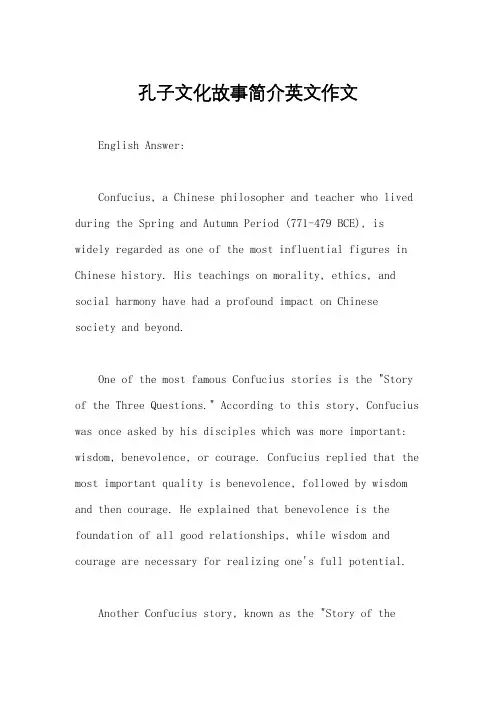
孔子文化故事简介英文作文English Answer:Confucius, a Chinese philosopher and teacher who lived during the Spring and Autumn Period (771-479 BCE), is widely regarded as one of the most influential figures in Chinese history. His teachings on morality, ethics, and social harmony have had a profound impact on Chinese society and beyond.One of the most famous Confucius stories is the "Story of the Three Questions." According to this story, Confucius was once asked by his disciples which was more important: wisdom, benevolence, or courage. Confucius replied that the most important quality is benevolence, followed by wisdom and then courage. He explained that benevolence is the foundation of all good relationships, while wisdom and courage are necessary for realizing one's full potential.Another Confucius story, known as the "Story of theUncarved Block," emphasizes the importance of self-cultivation and personal development. In this story, Confucius compares an uncarved block of wood to a person who has not yet developed their full potential. He saysthat just as a skilled carver can transform an uncarved block into a beautiful work of art, so too can a person develop their own potential through education and self-discipline.Confucius also believed that education is essential for the development of a harmonious society. He emphasized the importance of studying the classics, such as the Book of Rites and the Book of Songs, in order to learn about the values and traditions of Chinese culture. He also believed that education should be accessible to all people, regardless of their social status.Confucius's teachings have had a lasting impact on Chinese society. His emphasis on morality, ethics, and social harmony has helped to shape the values and beliefs of the Chinese people. His teachings have also been influential in other East Asian countries, such as Japan,Korea, and Vietnam.中文回答:孔子的文化故事。
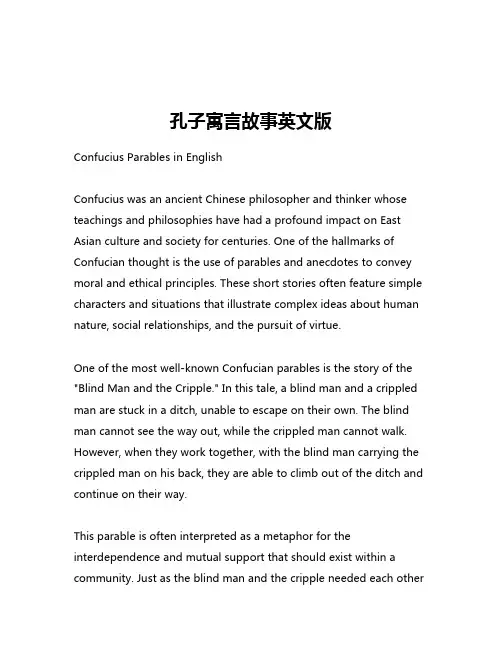
孔子寓言故事英文版Confucius Parables in EnglishConfucius was an ancient Chinese philosopher and thinker whose teachings and philosophies have had a profound impact on East Asian culture and society for centuries. One of the hallmarks of Confucian thought is the use of parables and anecdotes to convey moral and ethical principles. These short stories often feature simple characters and situations that illustrate complex ideas about human nature, social relationships, and the pursuit of virtue.One of the most well-known Confucian parables is the story of the "Blind Man and the Cripple." In this tale, a blind man and a crippled man are stuck in a ditch, unable to escape on their own. The blind man cannot see the way out, while the crippled man cannot walk. However, when they work together, with the blind man carrying the crippled man on his back, they are able to climb out of the ditch and continue on their way.This parable is often interpreted as a metaphor for the interdependence and mutual support that should exist within a community. Just as the blind man and the cripple needed each otherto overcome their individual limitations, so too should members of a society draw on each other's strengths and compensate for each other's weaknesses. The message is one of cooperation, empathy, and the recognition that we all have something to contribute to the greater good.Another well-known Confucian parable is the story of the "Broken Piece of Jade." In this tale, a man finds a broken piece of jade and, recognizing its inherent value, decides to keep it and polish it, rather than discarding it. Over time, the man's efforts transform the broken piece of jade into a beautiful and valuable object.This parable is often interpreted as a metaphor for the inherent worth and potential of all human beings, regardless of their current circumstances or apparent flaws. Just as the broken piece of jade was transformed into something of great beauty and value, so too can individuals who are seemingly "broken" or imperfect be nurtured and developed into something extraordinary. The message is one of compassion, patience, and the belief in the ability of all people to grow and improve.One of the most famous Confucian parables is the story of the "Farmer and the Snake." In this tale, a farmer discovers a snake that has been frozen by the cold and takes pity on it, bringing it into his home to warm it up. As the snake begins to thaw, it suddenly turnson the farmer and bites him, causing the farmer to exclaim, "How could you do this to me after I saved your life?"This parable is often interpreted as a cautionary tale about the dangers of trusting those who have harmed us in the past, or of showing kindness to those who may not be worthy of it. The message is one of prudence, discernment, and the recognition that even the most well-intentioned actions can sometimes have unintended consequences.Another Confucian parable that is often cited is the story of the "Monkey Trainer." In this tale, a monkey trainer is teaching his monkeys to perform a series of tricks, and he rewards them with food when they perform the tricks correctly. However, the trainer soon realizes that the monkeys are not learning the tricks for the sake of learning, but rather for the reward of the food. Frustrated, the trainer decides to withhold the food, and the monkeys quickly lose interest in the tricks and refuse to perform them.This parable is often interpreted as a metaphor for the importance of intrinsic motivation and the dangers of relying too heavily on extrinsic rewards. The message is that true learning and growth can only come from a genuine desire to learn and improve, rather than from a focus on external incentives or punishments. The parable suggests that the best way to cultivate virtue and wisdom is to fostera love of learning and a commitment to self-improvement, rather than simply chasing after rewards or avoiding punishments.Finally, one of the most well-known Confucian parables is the story of the "Broken Piece of Jade." In this tale, a man finds a broken piece of jade and, recognizing its inherent value, decides to keep it and polish it, rather than discarding it. Over time, the man's efforts transform the broken piece of jade into a beautiful and valuable object.This parable is often interpreted as a metaphor for the inherent worth and potential of all human beings, regardless of their current circumstances or apparent flaws. Just as the broken piece of jade was transformed into something of great beauty and value, so too can individuals who are seemingly "broken" or imperfect be nurtured and developed into something extraordinary. The message is one of compassion, patience, and the belief in the ability of all people to grow and improve.Overall, the parables and anecdotes of Confucius are a rich and enduring part of the Chinese philosophical tradition. They offer timeless lessons about the importance of virtue, social harmony, and the cultivation of wisdom and character. By studying these stories and reflecting on their deeper meanings, we can gain valuableinsights into the human condition and the pursuit of a meaningful and fulfilling life.。
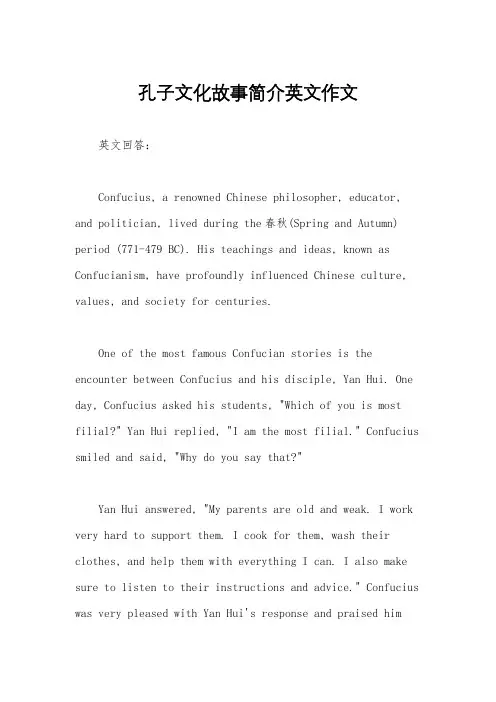
孔子文化故事简介英文作文英文回答:Confucius, a renowned Chinese philosopher, educator, and politician, lived during the春秋(Spring and Autumn) period (771-479 BC). His teachings and ideas, known as Confucianism, have profoundly influenced Chinese culture, values, and society for centuries.One of the most famous Confucian stories is the encounter between Confucius and his disciple, Yan Hui. One day, Confucius asked his students, "Which of you is most filial?" Yan Hui replied, "I am the most filial." Confucius smiled and said, "Why do you say that?"Yan Hui answered, "My parents are old and weak. I work very hard to support them. I cook for them, wash their clothes, and help them with everything I can. I also make sure to listen to their instructions and advice." Confucius was very pleased with Yan Hui's response and praised himfor his true filial piety.Another well-known Confucian story is the "Three-Year Mourning Ritual." Confucius believed that it was important to honor one's parents and ancestors by observing a period of mourning after their death. During this time, the family would wear simple garments, refrain from eating meat and drinking alcohol, and live a life of quiet reflection.Confucius said, "For three years, one should mourn for one's parents. Those who fail to do so are considered unfilial." This ritual demonstrated the deep respect and love that Confucian culture placed on family and the bonds between parents and children.Confucius also emphasized the importance of education and learning. He believed that education should not be limited to the privileged few but should be accessible to all. He established his own school and accepted students from all backgrounds, regardless of their social status or wealth.Confucius' teachings on morality, filial piety, education, and government have had a lasting impact on Chinese culture. His ideas have shaped Chinese values and beliefs, and his teachings continue to be studied and revered to this day.中文回答:孔子,中国著名的思想家、教育家和政治家,生活在春秋时期(公元前771-479年)。
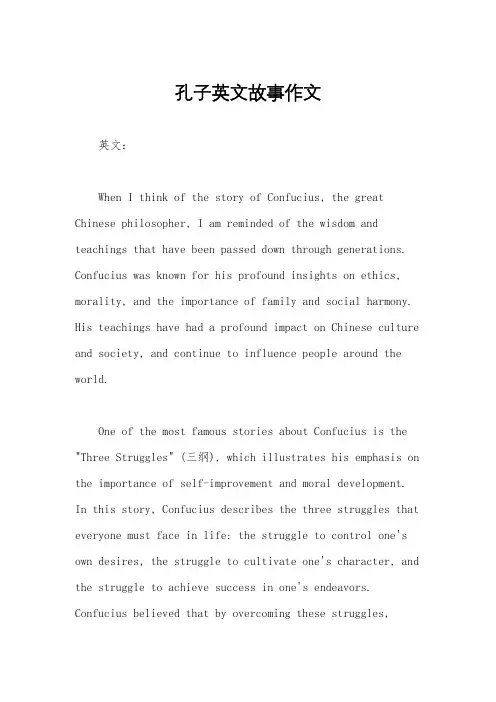
孔子英文故事作文英文:When I think of the story of Confucius, the great Chinese philosopher, I am reminded of the wisdom and teachings that have been passed down through generations. Confucius was known for his profound insights on ethics, morality, and the importance of family and social harmony. His teachings have had a profound impact on Chinese culture and society, and continue to influence people around the world.One of the most famous stories about Confucius is the "Three Struggles" (三纲), which illustrates his emphasis on the importance of self-improvement and moral development. In this story, Confucius describes the three struggles that everyone must face in life: the struggle to control one's own desires, the struggle to cultivate one's character, and the struggle to achieve success in one's endeavors. Confucius believed that by overcoming these struggles,individuals could become virtuous and contribute to thewell-being of society.Another well-known story about Confucius is the "Analects" (论语), which is a collection of his teachings and conversations with his disciples. In the Analects, Confucius emphasized the importance of filial piety,respect for elders, and the cultivation of personal virtues such as benevolence, righteousness, and propriety. These teachings continue to be a guiding force in Chinese society, shaping the behavior and values of individuals.中文:说到孔子的故事,我就想起了那些代代相传的智慧和教诲。
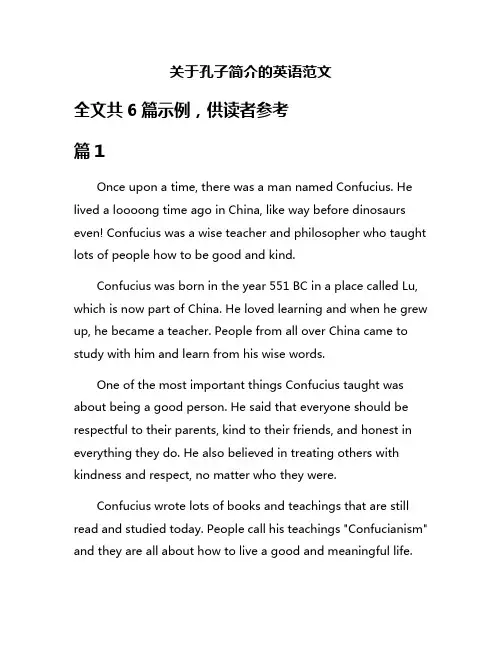
关于孔子简介的英语范文全文共6篇示例,供读者参考篇1Once upon a time, there was a man named Confucius. He lived a loooong time ago in China, like way before dinosaurs even! Confucius was a wise teacher and philosopher who taught lots of people how to be good and kind.Confucius was born in the year 551 BC in a place called Lu, which is now part of China. He loved learning and when he grew up, he became a teacher. People from all over China came to study with him and learn from his wise words.One of the most important things Confucius taught was about being a good person. He said that everyone should be respectful to their parents, kind to their friends, and honest in everything they do. He also believed in treating others with kindness and respect, no matter who they were.Confucius wrote lots of books and teachings that are still read and studied today. People call his teachings "Confucianism" and they are all about how to live a good and meaningful life.teachings are still important today. People all around the world still look up to him and learn from his wise words. So remember, be kind, be respectful, and always try to be the best person you can be, just like Confucius taught us to do!篇2Once upon a time, there was a really wise and smart dude named Confucius. He was born in China around 551 BC in a place called Lu. People also call him Kong Zi, which is pretty cool.Confucius was super into learning and education. He believed that everyone should have the chance to learn and become a better person. He thought that being kind and respectful to others was important too. He came up with a bunch of sayings and teachings called the Analects, which are like rules on how to be a good person.Confucius also thought that rulers should be fair and just to their people. He believed that if leaders were good role models, then everyone else would follow along and be good too. He wanted to create a peaceful and harmonious society where everyone could live happily together.teachings still influence people today. Lots of people study his ideas and try to follow his advice on how to be a better person. He's like a really old-school life coach, but way cooler.So yeah, that's a little bit about Confucius. He was a super wise dude who wanted everyone to be their best selves and live in harmony with each other. Cool, right?篇3Once upon a time, there was a really smart and wise guy named Confucius, also known as Kong Zi in Chinese. He was born in China around 551 BC and became one of the greatest teachers and philosophers in history.Confucius believed in a harmonious society where everyone knew their place and acted with kindness and respect towards each other. He taught his students about the importance of family, education, and good manners. He believed in the idea of filial piety, which means respecting and obeying your parents and elders.Even though he lived a long time ago, Confucius' teachings are still important today. People all over the world study his ideas and try to live by his principles. He believed that with educationand moral values, anyone could become a better person and make the world a better place.Confucius traveled all around China teaching his ideas and principles to anyone who would listen. He wrote many books and poems that are still read and studied today. He was a very humble and generous person who cared deeply about thewell-being of others.In conclusion, Confucius was a truly remarkable person who left a lasting impact on the world. His teachings continue to inspire and educate people of all ages and backgrounds. He will always be remembered as one of the greatest thinkers and philosophers in history.篇4Once upon a time, there was a really wise man named Confucius. He was born in China a long, long time ago, in the year 551 BC. Confucius was a teacher and philosopher who had a lot of important things to say about how people should live their lives.Confucius believed in the importance of family and education. He thought that people should always try to do theright thing and be kind to each other. He also taught that people should respect their elders and follow the rules of society.One of the most famous sayings of Confucius is "Do not do to others what you do not want done to yourself." This means that people should treat others the way they would like to be treated.Confucius had a lot of students who studied with him and learned from his teachings. They wrote down all of his ideas and sayings so that they could be shared with people all over the world.Even though Confucius lived a long time ago, his ideas are still very important today. People all over the world still study his teachings and try to follow his wise advice. Confucius may be gone, but his legacy lives on forever.篇5Once upon a time, there was a really cool dude named Confucius. He was born in ancient China around 551 BC and he is one of the most famous thinkers in the whole wide world!Confucius had a lot of good ideas about how people should behave and how to make the world a better place. He believed inthe importance of respecting others, being kind, and always trying to improve yourself. He thought that if everyone followed his ideas, the world would be a much happier and peaceful place.Even though Confucius lived a long time ago, his teachings are still really important today. People all over the world study his ideas and try to follow his wise words. He has influenced so many people and his thoughts are still being talked about and celebrated today.So, next time you see a quote from Confucius or learn about him in school, remember what a great guy he was and how his ideas are still making a difference in the world today. Confucius may be gone, but his legacy lives on forever!篇6Once upon a time, there was a really smart dude named Confucius. He was born in China way back in 551 BC. Yeah, that's super-duper old!Confucius was all about spreading wisdom and knowledge to the peeps around him. He had lots of cool ideas about how to be a good person and make the world a better place. His teachings were called Confucianism, and they're still super important in China and beyond today.One of Confucius's most famous sayings is: "Do not do to others what you do not want done to yourself." That's pretty deep, right? It's all about treating others with kindness and respect, just like you want to be treated yourself.Confucius also believed in the importance of learning and education. He thought that everyone should have the chance to learn and grow, no matter who they are or where they come from. He was all about spreading knowledge and helping people become their best selves.Even though Confucius lived a crazy long time ago, his ideas are still super relevant today. People still study his teachings and try to follow his wise advice. So yeah, Confucius may beold-school, but he's definitely still a boss when it comes to spreading good vibes and wisdom.。
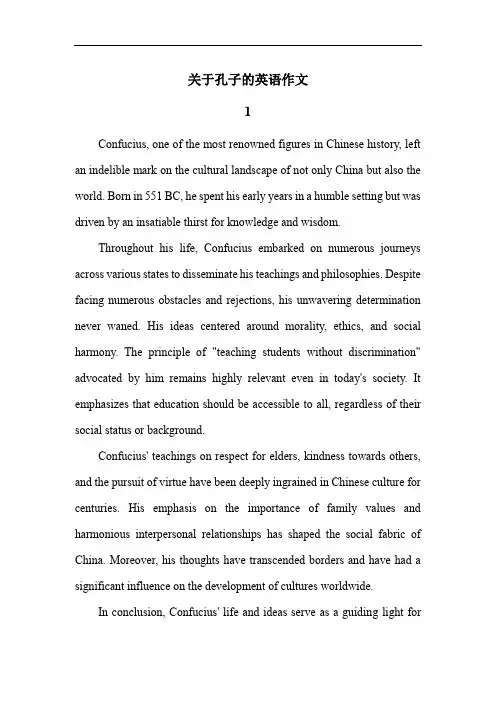
关于孔子的英语作文1Confucius, one of the most renowned figures in Chinese history, left an indelible mark on the cultural landscape of not only China but also the world. Born in 551 BC, he spent his early years in a humble setting but was driven by an insatiable thirst for knowledge and wisdom.Throughout his life, Confucius embarked on numerous journeys across various states to disseminate his teachings and philosophies. Despite facing numerous obstacles and rejections, his unwavering determination never waned. His ideas centered around morality, ethics, and social harmony. The principle of "teaching students without discrimination" advocated by him remains highly relevant even in today's society. It emphasizes that education should be accessible to all, regardless of their social status or background.Confucius' teachings on respect for elders, kindness towards others, and the pursuit of virtue have been deeply ingrained in Chinese culture for centuries. His emphasis on the importance of family values and harmonious interpersonal relationships has shaped the social fabric of China. Moreover, his thoughts have transcended borders and have had a significant influence on the development of cultures worldwide.In conclusion, Confucius' life and ideas serve as a guiding light forhumanity, inspiring us to strive for moral excellence and to create a more harmonious and just society. His contributions will continue to be cherished and passed down from generation to generation.2Confucius, one of the most influential philosophers in Chinese history, has left an indelible mark on the world with his profound thoughts. His core concepts, such as "Ren" and "Li", have significant implications for the construction of social order."Ren" refers to benevolence and kindness towards others. It is not just a simple act of being nice, but a deep-rooted attitude of caring and respecting everyone. For instance, when Confucius was asked by one of his disciples about the meaning of "Ren", he replied, "One should love others as oneself." This statement emphasizes the importance of putting oneself in others' shoes and showing genuine compassion."Li" represents propriety and ritual. It governs people's behaviors and interactions in society. Confucius believed that following the rituals and norms helps maintain harmony and order. He taught his disciples that proper conduct in various situations, such as ceremonies and daily life, is essential for a peaceful and prosperous society.The combination of "Ren" and "Li" forms the foundation of Confucius' teachings. A society where people practice "Ren" and abide by "Li" is likely to be a just and harmonious one. For example, in a family, ifmembers show kindness and respect to each other following the rituals of filial piety and love, the family will be filled with warmth and unity.In conclusion, Confucius' ideas of "Ren" and "Li" are timeless and still hold great value today. They provide guiding principles for us to build a better and more harmonious world.3Confucius, an outstanding philosopher and educator in ancient China, has left an indelible mark on the development of human civilization. His thoughts and teachings have not only endured through the ages but also continue to exert a profound influence on modern society.In the field of education, the moral teachings of Confucius have been integrated into school curricula. Students are taught the importance of virtues such as kindness, respect, and diligence. This helps them build a solid moral foundation and develop a sense of responsibility towards society. For example, the principle of "Do not do to others what you do not want others to do to you" is widely emphasized, guiding students to treat others with empathy and kindness.In the context of international cultural exchanges, Confucius' thoughts have also spread far and wide. They have provided a valuable reference for people from different countries to understand Chinese culture and values. Many international academic conferences and cultural events focus on discussing and promoting Confucius' ideas, facilitating culturalcommunication and mutual understanding among nations.The inheritance and development of Confucius' thoughts in modern society are not accidental. They reflect the common pursuit of human beings for wisdom and morality. As we move forward, we should continue to draw wisdom from these ancient teachings and apply them to address the challenges and opportunities of the contemporary world, so as to create a more harmonious and prosperous society.4Confucius, one of the most renowned philosophers and educators in ancient China, has left an indelible mark on the world with his wisdom and charisma. His teachings and stories have been passed down through generations, serving as a guiding light for countless people.Confucius lived in a time of great turmoil and social unrest. Despite facing numerous challenges and obstacles, he remained steadfast in his pursuit of moral and ethical principles. For instance, when confronted with the corruption and chaos of the political landscape, he did not give in to despair or compromise his beliefs. Instead, he traveled from place to place, sharing his ideas and hoping to inspire rulers and common people alike to embrace virtue and righteousness.His wisdom was not only reflected in his teachings on governance and social order but also in his emphasis on personal cultivation and moral development. He believed that through self-discipline, learning, andreflection, one could become a person of integrity and benevolence.Confucius also advocated for the importance of respect for elders, kindness towards others, and the pursuit of knowledge. His sayings such as "Do not do to others what you do not want done to yourself" have become universal maxims that continue to shape our values and behavior today.In conclusion, Confucius' wisdom and personality魅力have endured through the ages, influencing and inspiring people of all cultures and backgrounds. His teachings remain as relevant and valuable now as they were thousands of years ago, guiding us towards a more harmonious and just society.5Confucius, a remarkable figure in ancient China, has made profound and lasting contributions to the development of global philosophy. His teachings and thoughts have not only influenced generations of Chinese people but also had a significant impact on the philosophical landscape worldwide.Confucius emphasized the importance of moral virtues such as benevolence, righteousness, propriety, wisdom, and trustworthiness. His philosophy focused on the cultivation of individual character and harmonious relationships within society. In contrast to some Western philosophical schools that might prioritize individual rights and freedoms,Confucianism places greater emphasis on the collective well-being and social order.However, this does not mean that Confucianism and other philosophical traditions are mutually exclusive. For instance, both Confucianism and Stoicism share the idea of self-control and the pursuit of inner peace. Stoics believe in accepting the inevitable with equanimity, while Confucius advocated for moral self-discipline and the acceptance of one's social responsibilities.The influence of Confucian thought extends far beyond China. In many Asian countries, its principles have shaped cultural values and social norms. Even in the contemporary global context, the concepts of mutual respect, harmony, and moral integrity advocated by Confucius provide valuable insights for addressing various social and ethical challenges.In conclusion, Confucius' philosophy remains a vital source of wisdom and inspiration, contributing significantly to the rich tapestry of global philosophical thought and guiding humanity towards a more harmonious and virtuous existence.。
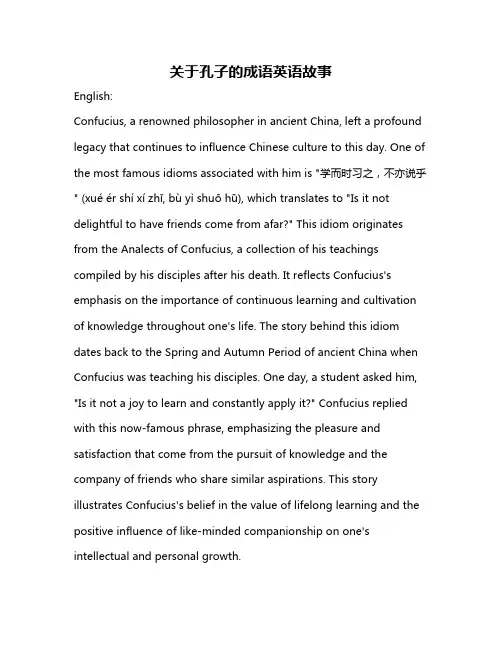
关于孔子的成语英语故事English:Confucius, a renowned philosopher in ancient China, left a profound legacy that continues to influence Chinese culture to this day. One of the most famous idioms associated with him is "学而时习之,不亦说乎" (xué ér shí xí zhī, bù yì shuō hū), which translates to "Is it not delightful to have friends come from afar?" This idiom originates from the Analects of Confucius, a collection of his teachings compiled by his disciples after his death. It reflects Confucius's emphasis on the importance of continuous learning and cultivation of knowledge throughout one's life. The story behind this idiom dates back to the Spring and Autumn Period of ancient China when Confucius was teaching his disciples. One day, a student asked him, "Is it not a joy to learn and constantly apply it?" Confucius replied with this now-famous phrase, emphasizing the pleasure and satisfaction that come from the pursuit of knowledge and the company of friends who share similar aspirations. This story illustrates Confucius's belief in the value of lifelong learning and the positive influence of like-minded companionship on one's intellectual and personal growth.Translated content:孔子,中国古代著名的哲学家,留下了深远的影响,至今仍然影响着中国文化。
孔子的生平经历英语作文(中英文实用版){z}Title: The Life of ConfuciusConfucius, whose original name was Kong Qiu, was a renowned Chinese philosopher and teacher who lived from 551 to 479 BC.He is considered one of the most influential figures in Chinese history and his teachings have had a profound impact on Chinese culture, philosophy, and ethics.Confucius was born into a humble family in the state of Lu, which is present-day Shandong Province.His father, a high-ranking official, died when Confucius was three years old, leaving him in the care of his mother.Despite their poverty, Confucius received a good education, studying poetry, music, and history.At the age of 19, Confucius became a teacher, opening his own school and teaching a small group of students.He believed in the power of education to improve individuals and society, and he emphasized the importance of moral character, respect for authority, and proper behavior in his teachings.In his early thirties, Confucius became involved in politics when he was appointed as the Minister of Works in the state of Lu.However, his political career was short-lived as he was later accused of corruption and had to resign.After his resignation, Confucius traveled extensivelythroughout China, visiting other states and learning from various philosophies and cultures.It was during this time that Confucius further developed his philosophical ideas and teachings.He believed that in order to achieve social harmony and personal fulfillment, individuals must cultivate virtues such as仁(ren), which means benevolence or humaneness, and礼(li), which means proper conduct or ritual.Confucius returned to his home state of Lu in his fifties and resumed his role as a teacher.He continued to teach and spread his philosophy until his death at the age of 72.His teachings were later compiled into a book called the "Analects," which is still studied and revered today.Confucius"s philosophy emphasizes the importance of moral character, education, and proper behavior in both personal and social life.His ideas have had a lasting impact on Chinese society and have been influential in the development of other East Asian cultures.Confucius is buried in his hometown of Qufu, where he is still honored as a national hero and his teachings continue to inspire people around the world.。
孔子作文英文故事翻译英文:Once upon a time, there was a great philosopher named Confucius. He was known for his wisdom and teachings, and many people came to him seeking advice. One day, a young man approached him and asked, "Master, how can I become as wise as you?"Confucius replied, "If you want to become wise, you must first learn to be humble. Only by recognizing your own limitations can you truly begin to learn and grow."The young man nodded, but still seemed unsure. Confucius continued, "You must also be willing to make mistakes and learn from them. Wisdom is not something that can be gained overnight, but rather it is a lifelong journey of self-improvement."The young man thanked Confucius and left, determined tofollow his advice. Over the years, he worked hard to cultivate humility and learn from his mistakes. Eventually, he became known for his own wisdom and teachings, and many people came to him seeking advice, just as they had once come to Confucius.中文:从前,有一位伟大的哲学家孔子。
孔子英文故事作文初中英文:As a student in China, I have heard many stories about Confucius. He is one of the most famous philosophers in Chinese history. His teachings have had a great impact on Chinese culture and society.Confucius was born in 551 BC in the state of Lu, which is now part of modern-day Shandong Province. He was a teacher, philosopher, and politician. His teachings were focused on morality, ethics, and social relationships.One of Confucius' most famous teachings is the Golden Rule, which states, "Do not do to others what you would not want done to yourself." This principle is still widely respected in China today.Another important aspect of Confucianism is the concept of filial piety, which emphasizes the importance ofrespecting and caring for one's parents and elders. This is also a deeply ingrained value in Chinese culture.In addition to his teachings, Confucius also had a profound influence on the Chinese language. He is credited with helping to standardize the written Chinese languageand his works are still studied and admired today.Overall, Confucius was a great thinker and teacher who had a lasting impact on Chinese culture and society.中文:作为中国的一名学生,我听过很多关于孔子的故事。
关于孔子的故事英语作文100字In the ancient city of Lu, lived a wise man named Confucius. One sunny afternoon, he saw a child playing near a well. Curious, he approached and asked the child what he was doing. The child replied, "Throwing stones into the well to see it splash." Confucius's eyebrows furrowed. He gently took the child aside and said, "Do you see those plants and trees? They thrive because of the water fromthis well. If you continue throwing stones, they will die, and the animals and people who rely on them will suffer. Kindness is like water; it nourishes everything. Be wise and use your actions to bring joy, not pain." The child nodded, understanding the lesson of kindness.**孔子关于善良的教诲**在古老的鲁国,住着一个名叫孔子的智者。
一个阳光明媚的下午,他看到一个孩子在井边玩耍。
出于好奇,他走近询问孩子在做什么。
孩子回答说:“往井里扔石头,看水花四溅。
”孔子的眉头紧锁。
他轻轻地把孩子拉到一边,说:“你看到那些植物和树木了吗?它们因为这口井里的水而茁壮成长。
孔子事迹英文作文1. Born into a noble family in the state of Lu, Confucius was known for his wisdom and knowledge from a young age. He studied the classics and worked as a teacher and government official, but ultimately becamedisillusioned with the corrupt political system of his time.2. Confucius believed in the importance of moral values and ethical behavior, and spent much of his life teaching these principles to his disciples. He emphasized the importance of respect for elders, honesty, and loyalty, and believed that these values were essential for creating a harmonious society.3. Despite facing opposition from those in power, Confucius remained committed to his beliefs and continuedto spread his teachings throughout his life. He traveled extensively throughout China, meeting with rulers and scholars and sharing his wisdom with all who would listen.4. Today, Confucius is remembered as one of thegreatest philosophers in Chinese history, and his teachings continue to influence people around the world. His emphasis on moral values, respect for tradition, and the importanceof education have made him a beloved figure in Chinese culture and a source of inspiration for generations to come.。
孔子英文故事作文初中Once upon a time, there was a wise man named Confucius. He was a great thinker and educator in ancient China. People from all over the country came to him to seek advice and wisdom.One day, a young man came to Confucius and asked him, "Master, what is the most important thing in life?" Confucius thought for a moment and replied, "The most important thing in life is to be kind and respectful to others. Treat others as you would like to be treated."Another time, a wealthy merchant sought Confucius' counsel on how to become successful. Confucius told him, "To be successful, one must be honest and hardworking. Do not seek success at the expense of others, but strive to achieve it through your own efforts."Confucius also emphasized the importance of learning and self-improvement. He once said, "Learning is a lifelongjourney. It is important to constantly seek knowledge and wisdom, and to reflect on one's own actions and beliefs."In his teachings, Confucius stressed the value of family and relationships. He believed that harmony within the family and society was essential for a peaceful and prosperous life. He said, "Respect your parents and elders, and treat your siblings with love and care. In doing so, you will create a harmonious and happy family."Confucius' teachings have had a profound impact on Chinese culture and society. His wisdom and philosophy continue to inspire people around the world to this day.。
用英语讲孔子的故事
The Story of Confucius
Confucius was a Chinese philosopher who lived during the 6th to 5th century BC. He is considered to be one of the most influential figures in Chinese history. He is best known for his teachings on morality, ethics, and social order.
Confucius was born in the small province of Lu in 551 BC. His father died when he was just three, leaving him to be raised by his mother and older brother. From an early age, Confucius showed a talent for learning and had studied many of the ancient works of Chinese literature.
At the age of thirty, Confucius began to search for a job as a teacher. He travelled to different parts of China, giving lectures on subjects such as ethics, politics, philosophy, and literature. His teachings were well received by the people, and he gained many followers.
Confucius believed that a society could only be successful if it was based on a system of justice. He taught people to respect their elders, and practice compassion in all aspects of their lives. He stressed the importance of education and encouraged people to strive for excellence.
Confucius wrote many works on his teachings which are now
known as the Analects. These books have become very influential and are still studied by scholars around the world today.
Confucius died in 479 BC, but his legacy lives on. His teachings are still studied and applied in many parts of Asia and elsewhere. He is remembered as one of the most influential figures in Chinese history and his teachings are still used to shape the way people think, act, and live.。